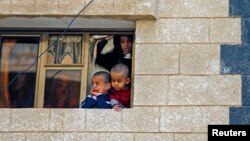The future of the Yemeni government is uncertain after President Abd Rabbuh Mansour Hadi reportedly submitted his resignation. This comes after the government reached an agreement with Houthi rebels, promising to share power in exchange for a withdrawal of rebel troops.
Analysts say most likely the Houthis initially stopped short of taking over the government because the rebel group could possibly wield more power from behind the scenes.
But as he walks the streets of the Yemeni capital Thursday, 29-year-old human rights activist Fras Shamsan speaks on his mobile phone, saying the only thing locals really know-is that they do not know exactly what is going on.
“They are controlling everything. Even the president’s house," said Shamsan.
And senior Yemeni journalist Zaid Al-Alaya'a says the public has little faith in political “agreements.”
“You see in the agreement something within the papers. But in reality it is broken immediately. Sometimes the same day of signing it," said Al-Alaya'a.
The Houthis have been fighting the Yemeni government to retain their northern strongholds since the mid-2000s.
Houthis vs. al-Qaida
In September, Houthi fighters swept into the capital and they continue to battle for control of other parts of Yemen. Al-Alaya’a says the fighting is purely a competition for power among tribes, elite politicians and militias, including al-Qaida. But he says it could devolve into a sectarian conflict.
The Houthis are from a minority Shia sect in a majority Sunni country. And as the Houthis continue to fight for power, angry Sunni tribes are making alliances with al-Qaida in the Arabian Peninsula, the organization’s largest branch.
Al-Qaida’s new-found popularity, he adds, has nothing to do with anti-Western sentiment, but is a result of their attacks on the Houthis.
“Al-Qaida has found a very rich gain in the Houthis. They want to turn [it to]: ‘These Houthis are expanding in the country and we do not want this expanding to continue and we will stand against it,'" he said.
Iran vs Saudi Arabia
Besides a local struggle for power, he says, the conflict is widely viewed as a proxy war between Sunni Saudi Arabia and Shia Iran.
Ordinary people, he adds, do not care which group wins.
“Normal people-ordinary citizens-they do not care who is going to rule Yemen as long as they provide them with food, job opportunities, water, hospitals, education," said Al-Alaya'a.
And these basic life needs are in short supply in Yemen recently. The United Nations says nearly half of the people in Yemen are so poor they do not know where their next meal will come from.
On his phone as walks through Sana'a, Shamsan says people in some Yemeni cities are protesting, but most people are just trying to survive the constant crises.
“We can not actually do anything in this situation because everyone is in danger," he said.
And no one knows just how dangerous the situation may become, with the reports of the president and his Cabinet resigning. Yemeni Prime Minister Khaled Baha said his ministers did not want to engage in what they called "an unconstructive political maze."





